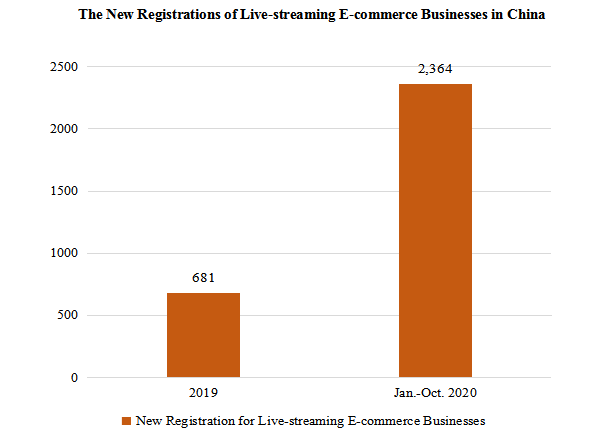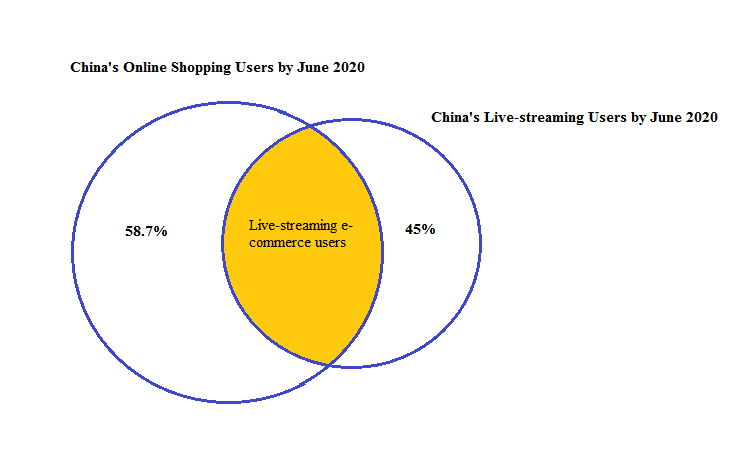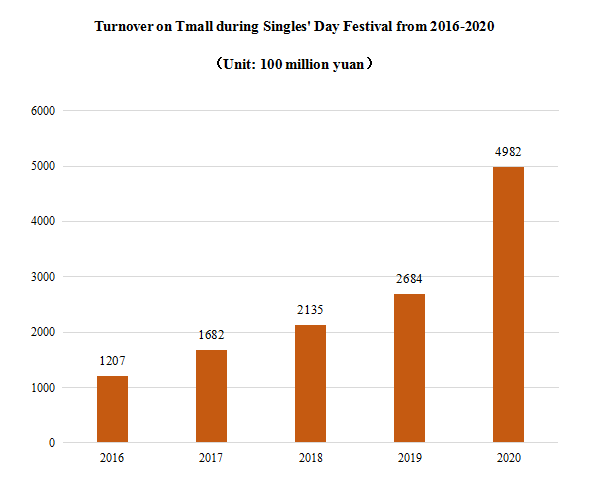
Makeup saleswomen use livestreaming marketing to boost the sale of cosmetic products at a shopping mall as the annual Nov. 11 online shopping spree approaches in Shijiazhuang, north China's Hebei Province, Nov. 10, 2020. (Photo by Chen Qibao/Xinhua)
BEIJING, Dec. 10 (Xinhua) -- The "cloud economy" in China has shown strong development momentum facing the COVID-19 pandemic.
Online education, online office, online game, smart healthcare and other "cloud economy" industries become rigid demands amid the pandemic, said Sun Ke, director of the Digital Economy Research Department with the China Academy of Information and Communications Technology (CAICT).
The gradual work and production resumption directly stimulated explosive demands for "cloud office", and meanwhile, these demands increased significantly during the pandemic, booming the "cloud economy", added Sun.
-- "Cloud economy" drives consumption recovery
Amid the COVID-19 pandemic, emerging consumption modes like "cloud live streaming", "cloud shopping" and "cloud experience" have attracted a great number of consumers. Live-streaming e-commerce with instant, immersive and interactive features develops rapidly in China this year.
Data from the Ministry of Commerce (MOC) showed that there had been more than ten million live-streaming services and over 400,000 active live-streaming hosts in China in the first half of 2020.
Data from Qcc.com, an enterprise information inquiry platform, showed that there were 681 newly-registered live-streaming e-commerce businesses in China in 2019, while the figure soared to 2,364 from January to October 2020, surpassing the total number of live-streaming e-commerce businesses registrations in the past ten years.

Source: Qcc.com
According to a report on the Internet development in China released by the China Internet Network Information Center (CNNIC), by June this year, China's online shopping users notched 749 million, including 41.3 percent or 309 million live-streaming e-commerce users, which accounted for 55 percent of the total 562 million live-streaming users.

Source: The 46th China Statistical Report on Internet Development
According to a report jointly released in October by KPMG and AliResearch, the research arm of Alibaba Group, the overall scale of China's live-streaming e-commerce is expected to exceed one trillion yuan this year.
The development potential has attracted increasing investment in live-streaming e-commerce. Up to October 2020, there were 38 investment and financing events occurred in live-streaming e-commerce, overtaking the total number of investment and financing events in the sector in 2018 and 2019.
During this year's Singles' Day online shopping spree, the gross merchandise volume (GMV) through live-streaming of e-commerce platforms surged 509.34 percent year on year.
Data from Alibaba Group's e-commerce platform Taobao showed that within ten minutes when the live-streaming started on October 21, the pre-sale volume exceeded that of the whole day of November 11, 2019, increasing by four times.
As of 24 o'clock on November 11, the turnover on Alibaba's online marketplace Tmall hit 498.2 billion yuan during its Singles' Day global carnival season extending from November 1 to 11.

Source: Alibaba
Live-streaming is also becoming the new growth engine of China's catering industry. On the evening of November 7, nearly 100 hot pot merchants jointly launched the "100 for 200" super voucher activity in the live broadcast services of Li Jiaqi, a well-known live-streaming host in China, attracting millions of online viewers, and the 40,000 hot pot vouchers prepared by Coucou Hot Pot were sold out in five seconds.
-- "Cloud economy" boasts Sino-foreign trade and investment cooperation
Affected by the COVID-19 pandemic, multiple projects, especially key government investment attraction projects, choose "cloud signing" or live broadcast to reach cooperation.
On February 25, Shanghai Pudong New Area held a key foreign-funded projects signing event in the form of "online plus offline, main venue plus branch venue" in order to prevent excessive concentration of people on site.
At the event, 21 key foreign-funded projects with a total investment of more than 1.7 billion U.S. dollars were contracted, covering supply chain management, medical devices, intelligent manufacturing, asset management and other fields, and involving investors from countries like the United States, Japan, Singapore, Britain and Switzerland.
Tianjin Municipality on April 8 held a "cloud signing" event for key investment attraction projects in 2020 in the form of "main venue plus remote video connection" by relying on technologies like big data and cloud platforms.
A total of 116 projects with a combined investment of 90.4 billion yuan were signed at the event, involving key fields such as intelligent technology, medicine and health, new energy and new materials, industrial manufacturing, high-end equipment, integrated circuits, trade and logistics, and financial leasing.
Of these projects, 28 are foreign-funded ones with a total investment of 2.161 billion U.S.dollars, while 88 are domestic-funded ones with a total investment of 75.127 billion yuan.
"Cloud" also marked a big feature of the third China International Import Expo (CIIE) by boasting "cloud signing", "cloud live-streaming", "cloud exhibition" and "cloud interview", etc., which was an innovation initiative of the expo and a model for global expos in the face of the pandemic.
During the Expo, leaders of many countries and heads of world organizations delivered speeches in the"cloud" manner at the event. Large trade and investment matchmaking conferences at CIIE provided professional services for 674 exhibitors and 1,351 buyers through the way of online and offline combined "cloud assistance", and as a result, 861 cooperation intentions were reached.
With the help of "cloud", the accumulated intentional turnover of the third CIIE reached 72.62 billion U.S. dollars, up 2.1 percent from the second CIIE.
The "cloud" method on the one hand expanded the influence of CIIE as it boasts wider audience and higher efficiency than face-to-face presentations, and on the other hand effectively prevented the spread of the pandemic, said Bai Ming, deputy director of the Institute of International Market Research with the Chinese Academy of International Trade and Economic Cooperation.
-- "Cloud economy" boasts broad prospects
With the continuous development of "cloud economy", related business and profit models are becoming clear, and the application of cloud computing-related technologies in various industries will continue to expand.
In the future, cloud services are expected to expand to nearly all industries. Various businesses of industries like logistics, telecommunications, medical care and finance will be carried out on the "cloud".
Because of the pandemic, every industry has more or less started the process of digitalization, and digital, network and intelligent applications have made China's economy more resilient in the face of the pandemic, said Ren Yuxin, Chief Operating Officer of Tencent.
According to the international research and advisory company Gartner, the global cloud computing market may reach 270 billion U.S. dollars by 2022, maintaining an average annual growth of about 20 percent in the following few years, and China's cloud market may grow faster than the world.
(Contributed by Gu Shanshan with Xinhua Silk Road, gushanshan.1987@163.com)




 A single purchase
A single purchase









